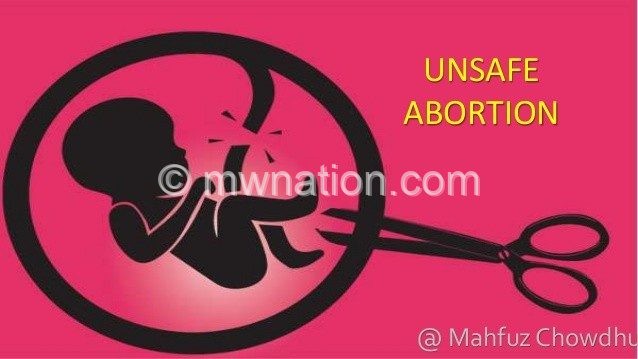Last year, the National Assembly rejected a motion to debate liberalising the country’s strict law against abortion, which is only allowed if the mother’s life is at risk. This is despite thousands of Malawian women dying each year from unsafe abortions. In this interview with MOSES MICHAEL-PHIRI, lawyer, human rights activist, sexual and reproductive health expert DR. GODFREY KANGAUDE argues that since reforms will take long, the grey area in law still requires an authoritative interpretation.
Q. How did you become interested in law and abortion?
A. I studied medicine for four years before I left to pursue philosophical and religious studies and then read law. Because of this background, during my postgraduate studies in law, I became interested in abortion and law.
Q. I hear you are interested in pursuing litigation on access to safe abortion. Can you tell me more about it?
A. Yes. There is a grey area in the law on access to safe abortion that requires an authoritative interpretation of the law. You see, raped and defiled underage minors are denied access to abortion in public facilities because clinicians interpret the law as prohibiting abortions unless there is a medical or psychiatric comorbidity. However, when we met with health providers, including obstetricians and gynaecologists, they affirmed that the pregnancy of a minor, especially a traumatic one resulting from sexual violation, is risky, so the minors should be offered a termination. I and others believe that such risky pregnancies qualify for legal abortion under the current law. However, because there are contrary opinions, it is proper that the matter be taken to court to get an authoritative interpretation on whether a 12-year-old who has been raped and becomes pregnant can lawfully terminate the pregnancy under the current legal framework.
Q. Why do you not just advocate that Parliament reforms the law so that this issue is clarified?
A. We are already doing that. But now, knowing that legal reforms can take long, we cannot ignore the current challenge with the grey area, because if a court would interpret the law to mean that raped and defiled minors can access abortion legally, then we solve an important problem for the under-age minors that are being denied the service. On the other hand, if the court was to clarify that raped underage minors cannot access safe abortion legally, then it would put the matter to rest, and this unjust situation can further motivate our advocacy efforts for reforming the abortion law. We cannot wait for Parliament to resolve this legal problem when the Judiciary, whose mandate is to interpret the law in accordance with constitutional norms, can provide a solution.
Q. This is interesting, how do you get the matter to court?
A. This is a significant challenge because the matter cannot spontaneously appear in court. There are several ways in which this matter could get to court. One way is for a girl or woman who believes that her rights have been infringed when she was denied an abortion. However, it is not easy for girls and women to take this up, for several reasons. First, abortion is a controversial issue, so the girl or woman may fear exposure to the public. Second, girls and women who can afford to pay or have connections with providers who can assist them safely or relatively safely discreetly get abortions and then are not interested in litigating. If there is no one willing to bring the matter to court, then nothing happens. Look, we have had this legal question since 1930, and since then, no girl or woman has taken up the matter to court, except the one case of 2021.
Q. What 2021 case are you referring to?
A. Well, in 2021, there was a judicial review case on abortion determined by the High Court sitting in Zomba. It was about a girl below 15 who became pregnant because of defilement. She went to the One Stop Centre in a public health facility in Blantyre and sought a termination, but she was refused. She then challenged the public facility for refusing to provide her with an abortion which she believed she was entitled to under the law. The matter, however, did not proceed to judicial review. Nevertheless, this was an important milestone, and I would want to see more such attempts.
Q. Do you think this would happen, that girls and women would take up the issue of abortion in courts?
A. I hope so. I do know that pregnancies of minors resulting from sexual violations are not scarce events in our communities. However, women have been disempowered both by the law and by cultural norms, and even politically, from taking action to challenge their being denied access to safe abortion even when they are legally entitled. Women of means or connections who access abortion quietly and safely contribute to the vicious circle of this political disempowerment because it removes any incentive for women to come together and fight for justice, including taking the matter to court. Those who suffer are the most vulnerable, the poor under-age minors who look up to us to do something about them, but we are not there for them.
Q. Any concluding words? A. I look forward to that day when women would come together and claim: “Enough is enough, can we be clear on whether our defiled underage daughters can lawfully access safe abortion!” Otherwise, I ask all people of Malawi to support bringing this legal question to the courts. Hopefully, the courts would vindicate the legal right of raped underage minors to access abortion because it is necessary to save their lives.
The post ‘There is a grey area on access to safe abortion’ first appeared on The Nation Online.
The post ‘There is a grey area on access to safe abortion’ appeared first on The Nation Online.
 Moni Malawi
Moni Malawi 

